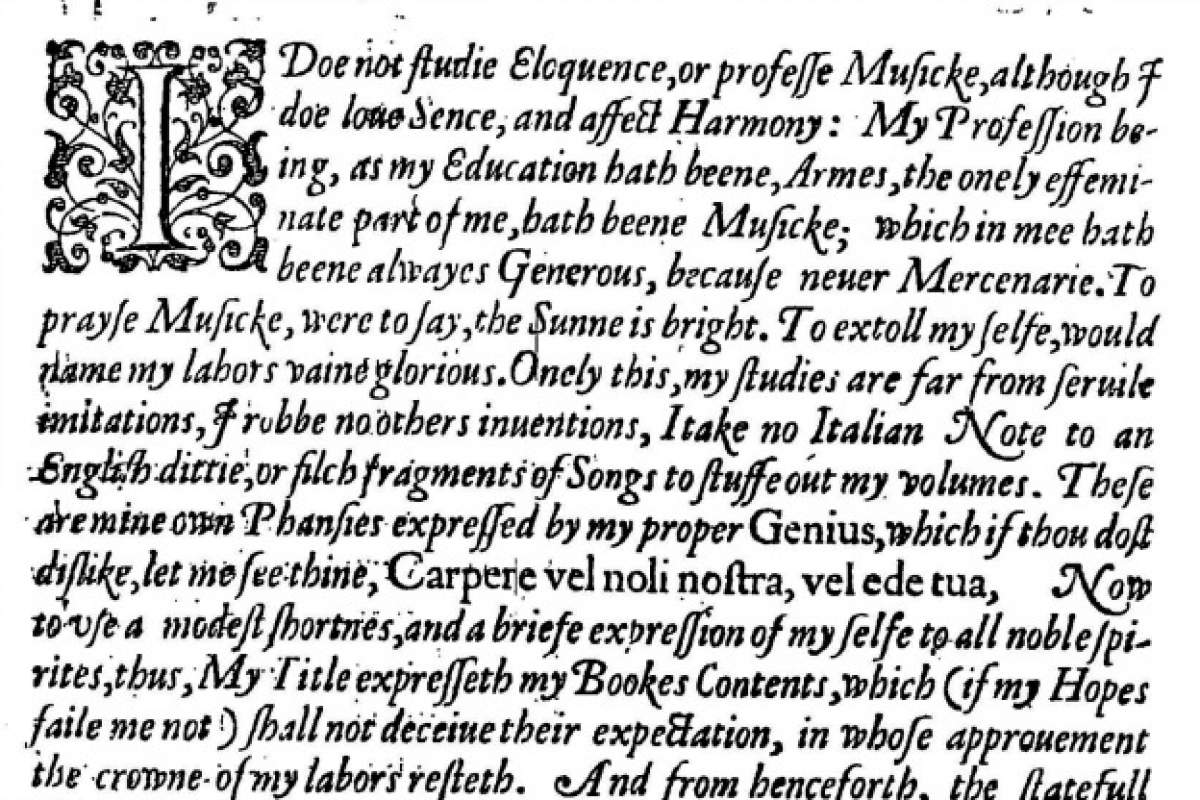
Work and Play
"Do what you love and you'll never work a day."
Good advice, right? Especially for a graduating high school senior trying to decide a major in college.
But what happens when the thing you love to do also becomes the thing you depend on to pay your bills? Can doing what you love also become a chore, or a source of stress? Do gourmet chef's eat ramen noodles or peanut butter and jelly sandwiches when they get home from their Michelin star restaurant? Do novelists still find enough creative pleasure to write their masterpiece in between time spent on commissions and copy editing? Do pop musicians tire of singing their big hit over and over on concert tours. What happens when play becomes work?
Tobias Hume
While the lucky ones manage to find a balanced intersection between job and passion, interests and career, there are some advantages to keeping the two separate.
In the preface to his First Part of Ayres printed in London in 1605 Tobias Hume, a military captain, wrote:
"I doe not studie Eloquence, or profess Musicke, altough I doe love Sence, and affect Harmony. My Profession being, as my Education hath beene, Armes, the onely effeminate part of me, hath been Musicke; which in mee hath beene alwayes Generous, because never Mercenarie."
Hume, who served as a soldier in the Swedish and Russian armies (among others), may have considered music his outlet for the pressures of military life. Captain Hume seems to say, "look, I'm not a pro here, but I sure do love making music! And music is even better because I can do it for pure pleasure rather than money, thanks to my job in the army."
So on the side, Hume published two collections of music, The First Part of Ayres for lyra viol just mentioned, and two years later in 1607, Captaine Humes Poeticall Musicke. We hear selections from both collections played on unaccompanied viol or up to three viols with harpsichord on a 2014 Alpha recording from Les Basses Réunies.Â
A piece called Souldiers Resolution tells a musical story, perhaps an embodiment of Hume's own military career.
The programmatic piece follows in the long tradition of battle music. (Think Biber's Battaglia, or Monteverdi's Combattimento.) Hume's Souldiers Resolution is complete with various subtitles including Counter March, The Cetill drum, Trumpets, and March Away.
Perhaps appropriately enough to follow a battle scene, Les Basses Réunies programs Hume's What greater griefe after the soldier songs on their CD.
Les Basses Réunies
Guido Balestracci plays the solo viol throughout the recording, but other tracks treat listeners to a fuller ensemble sound of multiple viols, and at times, a brass or gut strung harpsichord. And just a word here about that ensemble sound: the three viols played on this recording were newly built by instrument-maker Charles Riché and his assistant Friederike Dangel and were specifically matched for this project.
We tend to think of Stradivarius in Italy when considering string instrument makers, but England has a rich history of it as well, especially in terms of viols from the sixteenth century on. John Rose, Richard Blunt, Henry Jaye, William Baker, Richard Meares, Barak Norman are some of the most well-known. One of the viols on this recording is modeled on an instrument by John Rose, another of the newly built viols draws on elements from several different 17th-century English viol makers, while the largest of the three, a so-called "English great bass viol" is patterned after an instrument by Henry Jaye.
A recurring theme in Hume's publications is his eccentric titles. Hume often liked to make puns on his own name, like Captaine Humes Musicall Humors, or A Humorous Pavin, or A Careles Humor…
But there's also a whole slew of pieces with titles like Touch me sweetly, Touch me lightly, Touch me quickly, or Tickell tickell, and…
Whatever you're thinking, you're probably right! Hume was no saint. You can hear these along with the lighthearted, My Mistresse hath a pritty thing on Les Basses Réunies' recording.









